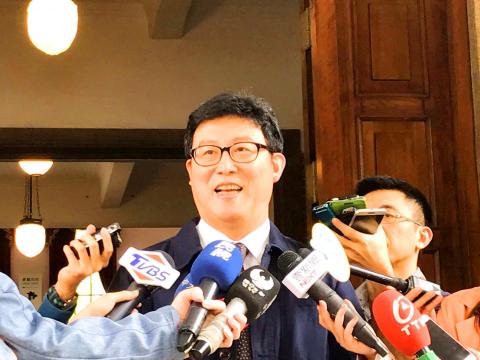Following the decapitation of statues of former President Chiang Kai-shek (蔣介石) and Japanese engineer Yoichi Hatta, a Democratic Progressive Party (DPP) lawmaker yesterday said he has drafted a bill that would repurpose the Chiang Kai-shek (蔣介石) Memorial Hall and relocate all the nation’s Chiang statues.
DPP Legislator Pasuya Yao (姚文智) said that he would today begin seeking endorsements from other lawmakers for the bill, which would see the abolishment of the Organization Act of National Chiang Kai-shek Memorial Management Office (國立中正紀念堂管理處組織法).
The proposal seeks to shutter the memorial hall to remove all symbols associated with Chiang and then refurbish it for other purposes, and the relocation of all Chiang statues nationwide to Chiang’s mausoleum in Taoyuan’s Dasi District (大溪).

Photo: CNA
“Statues [of Chiang] are the final remnant of the [Chinese Nationalist Party (KMT)] authoritarian regime, which has to be removed if a full-fledged democracy is to be realized,” Yao said
Yao, who has also advocated the phasing out of coins featuring Chiang’s portrait, said that President Tsai Ing-wen (蔡英文) would be blamed if the hall is not closed in the near future.
“It is the government’s fault that different groups in society have taken to engaging in vandalism,” Yao said, referring to the statue decapitations.
Hatta was a renowned civil engineer who built major irrigation systems in Taiwan during the Japanese colonial period. A statue of him was beheaded in Tainan earlier this month, allegedly by a former Taipei City councilor linked to a pro-unification group, as an act of revenge against the beheading of Chiang statues.
The vandalism has sparked a heated debate along political and ethnic lines about the legacy of the KMT government and the Japanese colonial era.
Retired army lieutenant general Wu Sz-huai (吳斯懷), who was at the center of a scandal involving retired generals participating in a political event in Beijing, said that the government’s acquiescence in the vandalizing of Chiang statues and its “honoring of Japanese” would intensify problems between ethnic groups, and “people would be prompted to vandalize totems of Japan.”
“It is because transitional justice has not been fully implemented that people are making such threats,” Yao said. “The last mile of transitional justice is the removal of authoritarian symbols. The government has to remove all those symbols to prevent conflicts.”
Meanwhile, in an apparent dig at Taipei Mayor Ko Wen-je (柯文哲), who has voiced opposition to proposals to remove Chiang symbols, Yao said there are still 47 Chiang statues in Taipei, which should be removed immediately.
Ko’s suggestion that past conflicts should be put aside in pursuit of a common future demonstrates his ignorance of history, as the commemoration of Chiang was institutionalized through abuse of power, and authoritarianism should be expunged from society, Yao said.

CHAOS: Iranians took to the streets playing celebratory music after reports of Khamenei’s death on Saturday, while mourners also gathered in Tehran yesterday Iranian Supreme Leader Ayatollah Ali Khamenei was killed in a major attack on Iran launched by Israel and the US, throwing the future of the Islamic republic into doubt and raising the risk of regional instability. Iranian state television and the state-run IRNA news agency announced the 86-year-old’s death early yesterday. US President Donald Trump said it gave Iranians their “greatest chance” to “take back” their country. The announcements came after a joint US and Israeli aerial bombardment that targeted Iranian military and governmental sites. Trump said the “heavy and pinpoint bombing” would continue through the week or as long

TRUST: The KMT said it respected the US’ timing and considerations, and hoped it would continue to honor its commitments to helping Taiwan bolster its defenses and deterrence US President Donald Trump is delaying a multibillion-dollar arms sale to Taiwan to ensure his visit to Beijing is successful, a New York Times report said. The weapons sales package has stalled in the US Department of State, the report said, citing US officials it did not identify. The White House has told agencies not to push forward ahead of Trump’s meeting with Chinese President Xi Jinping (習近平), it said. The two last month held a phone call to discuss trade and geopolitical flashpoints ahead of the summit. Xi raised the Taiwan issue and urged the US to handle arms sales to

BIG SPENDERS: Foreign investors bought the most Taiwan equities since 2005, signaling confidence that an AI boom would continue to benefit chipmakers Taiwan Semiconductor Manufacturing Co’s (TSMC, 台積電) market capitalization swelled to US$2 trillion for the first time following a 4.25 percent rally in its American depositary receipts (ADR) overnight, putting the world’s biggest contract chipmaker sixth on the list of the world’s biggest companies by market capitalization, just behind Amazon.com Inc. The site CompaniesMarketcap.com ranked TSMC ahead of Saudi Aramco and Meta Platforms Inc. The Taiwanese company’s ADRs on Tuesday surged to US$385.75 on the New York Stock Exchange, as strong demand for artificial intelligence (AI) applications led to chip supply constraints and boost revenue growth to record-breaking levels. Each TSMC ADR represents

State-run CPC Corp, Taiwan (CPC, 台灣中油) yesterday said that it had confirmed on Saturday night with its liquefied natural gas (LNG) and crude oil suppliers that shipments are proceeding as scheduled and that domestic supplies remain unaffected. The CPC yesterday announced the gasoline and diesel prices will rise by NT$0.2 and NT$0.4 per liter, respectively, starting Monday, citing Middle East tensions and blizzards in the eastern United States. CPC also iterated it has been reducing the proportion of crude oil imports from the Middle East and diversifying its supply sources in the past few years in response to geopolitical risks, expanding